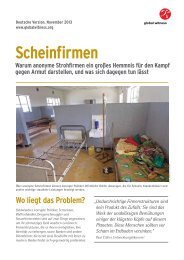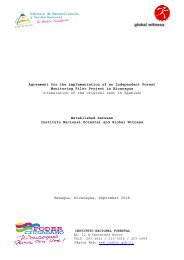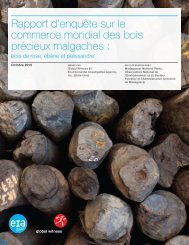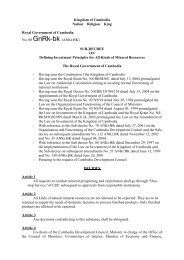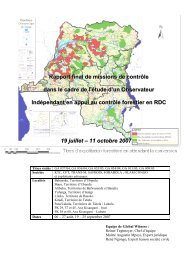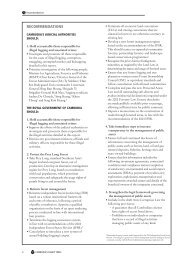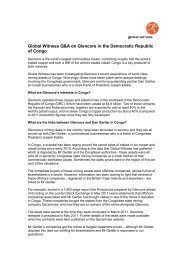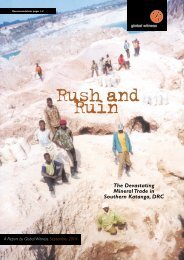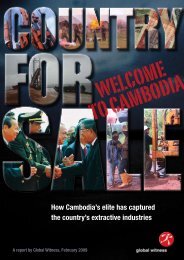03sep3 Conflict of Interests 60-89.pdf - Global Witness
03sep3 Conflict of Interests 60-89.pdf - Global Witness
03sep3 Conflict of Interests 60-89.pdf - Global Witness
Create successful ePaper yourself
Turn your PDF publications into a flip-book with our unique Google optimized e-Paper software.
Part Two: Logging in Burma / 17 The Thai-Burma Border<br />
17.4 The timber business and conflict on the<br />
Thai-Burma border<br />
“Systematic and unsustainable felling was carried out in<br />
areas largely under the control <strong>of</strong> insurgent groups such as<br />
the Karen National Army and the Mong Tai Army; both <strong>of</strong><br />
which, paradoxically, have been amongst the most<br />
outspoken in their denunciations <strong>of</strong> environmental<br />
destruction caused by the SLORC.” 17 Martin Smith, 1999<br />
Logging along the Thai-Burmese border could not have<br />
taken place without the various ethnic insurgents being<br />
‘compensated’ by the Thai logging companies. This led<br />
to informal four-way trade agreements between the<br />
Thai government, the Burmese government, Thai<br />
businessmen and insurgent groups.<br />
Whilst Rangoon granted concessions, the logging<br />
companies had to negotiate with one or more insurgent<br />
groups and with other logging companies to operate<br />
unhindered on the ground. Insurgent groups taxed the<br />
companies demanding ‘passage fees’ in exchange for<br />
safety guarantees. Soon after the concessions were<br />
granted it was reported that <strong>of</strong> the <strong>60</strong> companies<br />
operating in insurgent-held territory, only half <strong>of</strong> them<br />
actually held concessions granted by the SLORC. 198<br />
Between 1988 and 1993, Thai companies paid<br />
between $200 and $240 per m3 <strong>of</strong> timber from the<br />
border concessions. The regime itself earned $80 per<br />
cubic metre, whereas insurgent groups, such as the<br />
KNU, are estimated to have been paid between $40 and<br />
$80. Other costs included $20 to the original logging<br />
company, $12 to Thai Customs, $24 labour for felling<br />
9, 199<br />
and $24 for transportation.<br />
The logging companies initially paid the KNPP<br />
transport fees <strong>of</strong> 1500 baht ($<strong>60</strong>) per tang (1.6 tons),<br />
which at the time they had little<br />
option but to accept. However, the<br />
KNPP later renegotiated this to 3000<br />
baht($120) in November 1989. x In<br />
addition the group earned a great deal<br />
<strong>of</strong> money from illegal logging in<br />
forests outside the concession areas. 128<br />
Mon insurgents were reported to<br />
charge 3,000 baht ($120) in 1989 but by<br />
1990 they were charging 5,000 baht<br />
($200) per ton <strong>of</strong> wood for passage fees.<br />
At the Three Pagodas Pass passage fees<br />
were paid to both the KNU and the<br />
200, 201<br />
NMSP.<br />
According to the state-run newspaper<br />
The New Light <strong>of</strong> Myanmar about<br />
150,000 tons <strong>of</strong> teak were smuggled out <strong>of</strong><br />
Papun, Mela (Mae La) and Wawle (Wale)<br />
regions annually between 1986 and 1994.<br />
The article also claims that 200,000 tons <strong>of</strong><br />
“pyingadoe” (Ironwood), “in” and<br />
“kanyin” (Keruing) were smuggled<br />
x Conversion rates for 1989 $1=25 baht<br />
61<br />
A CONFLICT OF INTERESTS<br />
annually across the border from Phayathonzu to<br />
Taninthayi. The SPDC say that the KNU earned 400<br />
million baht, over $16 million, from this timber<br />
‘smuggling’ business; 65 million baht, over $2.6 million,<br />
from teak extraction in 1993 alone. 187 It is not known<br />
how accurate these figures are. However, the article<br />
appears to be blaming the Thai military, police and<br />
businesses for the forest destruction rather than the<br />
insurgents. It goes on to say that the Thai companies paid<br />
the KNU just $120 for each ton <strong>of</strong> teak, when the market<br />
price ranged from $500 to $800 per ton, for ordinary<br />
class, and from $2000 to $3000 per ton for special quality<br />
teak. 187 “Myanmar suffered much. But for Yodayas<br />
[Thais], they have gained more pr<strong>of</strong>its like the merchants<br />
who buy stolen goods at low prices.” 187<br />
Insurgent groups claimed that they did not have<br />
enough manpower to check whether logging companies<br />
were cutting in their concession areas or to check how<br />
much they were cutting, and logging appeared to be out<br />
<strong>of</strong> control.<br />
17.5 Thai Logging in Karen National Union territory<br />
“The taking and retaking <strong>of</strong> ground in the thinly-populated<br />
area <strong>of</strong>ten has less to do with the Karen fight for autonomy<br />
than with the struggle for control over the region’s lucrative<br />
logging business.” 202 The Nation, May 1993<br />
The Karen were prominent in the colonial forestry<br />
service created in 1856, although they were barred<br />
from senior positions. In 1950, just one year after<br />
taking up arms, the KNU established a Forestry<br />
Ministry that used Karen foresters trained under the<br />
British. The ministry was established<br />
along colonial lines with a hierarchy <strong>of</strong><br />
posts ranging from guards and rangers<br />
in the field, through district and<br />
headquarters conservators, to the<br />
Minister. The forests <strong>of</strong> Kawthoolei<br />
(the Karen name for Karen State)<br />
were divided into districts, within<br />
which reserved forests were created,<br />
notably where teak was abundant.<br />
The importance <strong>of</strong> the Forestry<br />
Ministry grew according to the<br />
increasing importance <strong>of</strong> the timber<br />
trade compared with other forms <strong>of</strong><br />
income such as taxing border trade<br />
and mining. By the 1980s there<br />
were 463 forestry <strong>of</strong>ficials working<br />
in Kawthoolei’s forestry districts<br />
with additional staff in<br />
Mannerplaw, whose main task was<br />
Timber sale agreement between the<br />
Government <strong>of</strong> Kawthoolei (KNU) and Thai<br />
Field Marshall; July 1989.<br />
to administer teak extraction.<br />
They were also responsible for<br />
reforestation and wildlife




